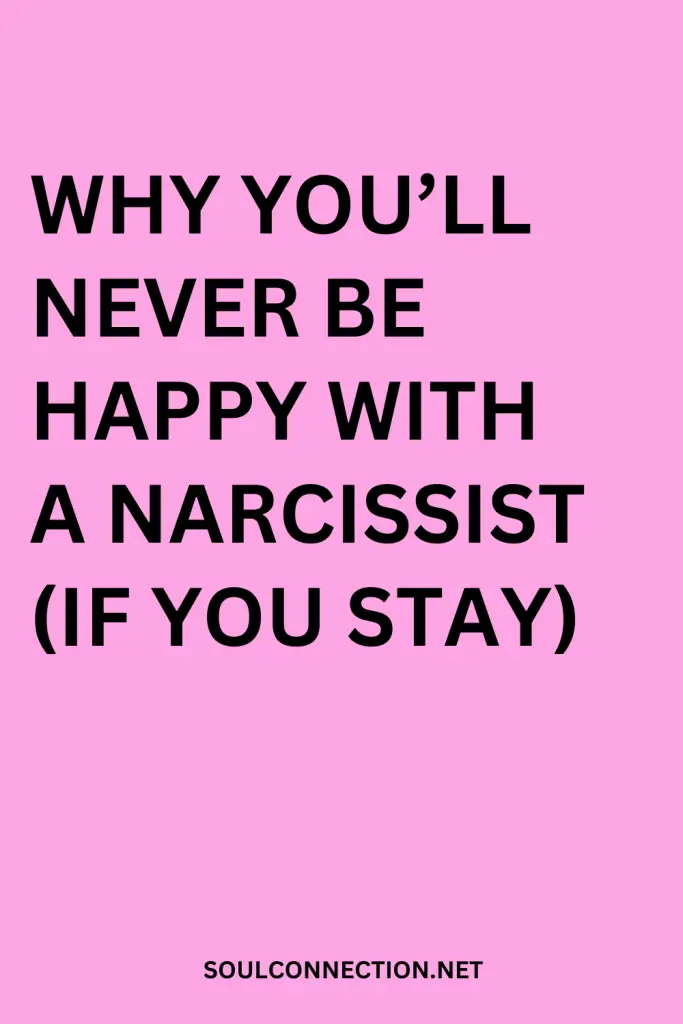Somewhere, nestled between the pages of self-help books and whispered at late-night kitchen tables, a certain hope lingers: Maybe, just maybe, you can love the narcissist in your life into becoming a better partner.
If only you give more, bend further, or crack the secret code. Spoiler alert: That’s not how this story ends.
Let’s get straight to the heart of it. Staying with a narcissist is like trying to fill a bathtub with the plug pulled out.
The effort’s there, but happiness keeps swirling down the drain.
The Illusion of Love Bombing
At first, being with a narcissist can feel a bit like starring in your own romantic comedy. The compliments, the grand gestures, the intoxicating attention—it’s all there. You’re the main character!
Trouble is, the fireworks show ends quicker than last night’s leftovers. What began as admiration turns into criticism and subtle digs.
That initial high? Manufactured, designed to hook you in. You weren’t whisked away by true devotion; you were baited.
Narcissists are masters at making you feel special—until you’re not.
The Moving Goalposts of Approval
Trying to gain a narcissist’s genuine approval can turn even the most self-assured soul into a puddle of anxiety. One day, you’re praised for your ambition. Blink, and now you’re “too obsessed with work.”
The finish line for “good enough” moves every time you think you’re close. Your efforts to please become exhausting marathons, with no medal at the end.
Why? A narcissist needs to keep you working for their validation, so you never notice you’re the one holding the relationship together.
Your Needs Don’t Make the Map
Ever tried to voice your unhappiness to a narcissist? The conversation has a way of boomeranging back to their grievances. Suddenly, you’re apologizing for having feelings.
Over time, you might stop sharing your needs altogether because the cost—arguments, the silent treatment, guilt trips—is just too steep.
Emotional needs become background noise. The relationship orbits around them, while your own happiness fades into the scenery.
Gaslighting: The Great Reality Bender
One of the most disorienting experiences with a narcissist is the slow, sneaky erosion of your grip on reality. You remember events one way; they insist it never happened, or you’re “too sensitive.”
Repeated enough, you start questioning your own memory, instincts, and sanity. Happiness has a tough time taking root when you can’t trust your own mind.
This manipulation isn’t accidental. It keeps you dependent and off-balance—right where a narcissist wants you.
The Emotional Bank Account Is Always Overdrawn
Relationships thrive on give-and-take. With a narcissist, the giving flows in one direction. Your emotional energy, empathy, and patience are withdrawn at every opportunity, while your deposits go unnoticed.
You’re left emotionally spent. When you ask for support, the response hovers somewhere between indifference and annoyance. It’s hard to feel happy when you’re running on fumes.
Intimacy Stays on the Surface
Real intimacy means letting your guard down and being vulnerable. With a narcissist, vulnerability gets weaponized.
Your secrets, quirks, and soft spots become ammunition in future arguments or reasons for mockery.
You end up constantly editing yourself, never sure what will be used against you. That kind of dance leaves little room for real connection or security. Happiness shrivels under the weight of self-censorship.
Love Looks Like a Transaction
Narcissists often keep a running tally of favors, gifts, and gestures. Expect to hear about the dinner they paid for—every single time you ask for anything in return.
Acts of love aren’t given freely, but as part of a contract you didn’t sign. Trying to negotiate actual affection? You’ll be met with reminders of how much you “owe,” how grateful you should be, how lucky you are.
That’s not love; it’s emotional accounting with a side of guilt.
You Become a Stranger to Yourself
After constant criticism, shifting expectations, and endless self-sacrifice, the person in the mirror might look familiar but feels unrecognizable.
Old hobbies, friendships, and passions wither from neglect. Your world shrinks. The spark that once made you, well, you, starts to fizzle.
The harder you try to regain it, the more you’re accused of being selfish or “too much.”
It’s hard to be happy when you’re not quite sure who you are anymore.
Conflict Means Punishment
Disagreements with a narcissist rarely end in healthy compromise. More often, you’re met with explosive anger, icy silence, or expertly deployed guilt. The aftermath leaves you walking on eggshells, dreading the next misstep.
Conflict is inevitable in any relationship, but with a narcissist, it’s weaponized to maintain control. Your happiness gets held hostage until you comply, apologize, or otherwise shrink yourself to fit their comfort zone.
Apologies Are a One-Way Street
Messed up? Prepare for a marathon apology session. But when your partner crosses a line, suddenly the dictionary is missing the word “sorry.”
Any attempt to get accountability is met with deflection, blame-shifting, or the ever-popular “You’re too sensitive.”
Over time, resentment stacks up. It’s pretty tough to move forward when only one person’s allowed a clean slate.
Growth Isn’t on the Menu
Strong relationships aren’t perfect, but they leave room for growth. With a narcissist, growth feels like a threat. If you succeed, you’re accused of showing off or abandoning them.
If you struggle, that’s ammunition for criticism or smug superiority.
Your attempts to improve yourself, the relationship, or your happiness always seem to feed their insecurities. Any growth—personal or together—is stunted at the root.
Love Feels Conditional
Catching yourself wondering what mood they’ll be in when you get home? Tallying up your “good” and “bad” days to predict whether you’re worthy of affection? That’s the hallmark of conditional love.
Narcissists dole out affection and approval when it serves them. Step out of line, and the warmth disappears. Happiness requires a sense of safety and consistency—things that are always in short supply here.
The Fantasy of Change
Every now and then, you might get a glimpse of the person you fell for—the charm, the laughter, the tenderness. That sliver of hope is powerful enough to keep you hanging on. “Maybe they’ll change.”
Yet, after the storm passes, the same patterns reappear. Narcissists rarely seek meaningful change (unless it serves their image).
Waiting for a transformation is like waiting for the bus in the outback: long, lonely, and not likely to happen any time soon.
Finding Your Way Back to Yourself
Leaving a narcissist is never easy. The push-pull, the self-doubt, the tangled web of memories—it’s all real. But your happiness is not a lost cause or a fairytale reserved for someone else.
Start small. Speak kindly to yourself. Reconnect with friends you’ve missed. Pick up a forgotten hobby, even if you feel rusty.
Happiness isn’t a destination, but the slow, stubborn reclaiming of your own life.
No one can make you happy all the time, but you deserve a partner who doesn’t actively stand in your way.
Happiness Is Not a Negotiation
Staying with a narcissist means living in a negotiation where the terms are always stacked against you. Genuine happiness just can’t sprout in that kind of soil.
If you’re reading this and it stings a little, that’s okay. Recognizing your reality is the bravest, first step. Happiness with a narcissist is a mirage—compelling from afar, but empty up close.
You are allowed to want more. And you can have it—if you’re willing to walk toward it, even if your knees are shaking.


